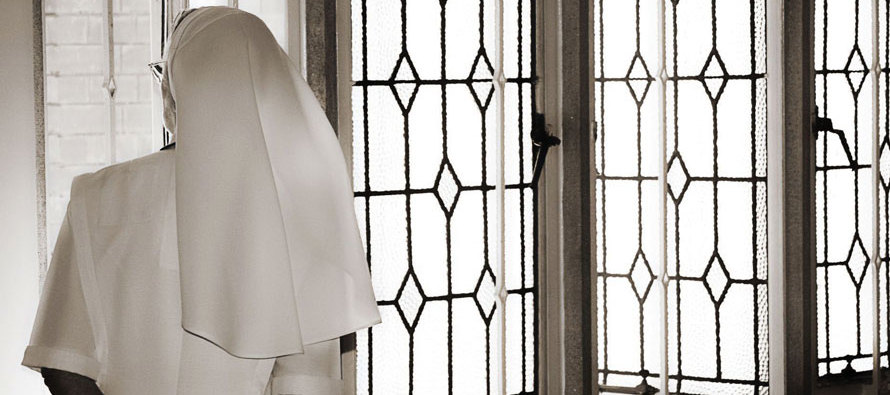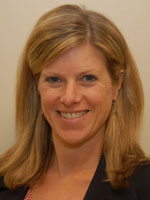How is your family taking it?

IT STARTED OUT as a simple conversation about college majors. Kathy Nace was sitting around the dinner table with her parents, discussing the pros and cons of majoring in English versus math, when her father said, “You’ll never support yourself with an English degree, unless you become a teacher.” Then her mother added, only half-joking, “Or, God forbid, if you enter the convent.” That’s when Nace decided it was time to tell her parents the truth: that she was pretty sure she felt called to religious life and was seriously planning to pursue it.
It didn’t come as huge shock to her family, since she had first mentioned the possibility back in fifth grade, and had become increasingly interested while taught by Sisters of St. Joseph at her Philadelphia high school. Yet, while her parents’ initial reaction to her news wasn’t overtly negative, they didn’t exactly jump with joy either. Nace says their feelings might best be described as cautious. “My parents were never antagonistic,” she remembers. “But it was always ‘Are you sure?’”
Her mother, who is also named Kathy, says she and her husband were trying to be practical. They wanted their daughter to finish college, have a social life, date, and have some life experiences before making such a serious lifetime commitment. “I didn’t want to have a situation where at 40 years old, she’d say she missed out on so many things,” says the older Kathy Nace. “We just felt if it was a true calling, she could go through this and then not have any regrets.”
Sister Kathy, now 34, remembers being somewhat frustrated by her parents’ practical concerns about making preparations in case she changed her mind. “My mom was always saying, “What if you leave?’” she recalls. “But she never said to my sister, ‘What if you don’t stay married?’” But while her parents’ initial lack of gung-ho support might have dampened some of Kathy’s early enthusiasm, it didn’t squelch her calling toward religious life. “If anything, it really put me in a position where I had to be clear for myself, and for my parents’ sake, too,” she says.
Now, 11 years after entering and two years after her final vows, Kathy realizes her parents just wanted what any parent wants—their daughter’s happiness. “And for them, being happy meant getting married, having good jobs, and a nice house,” she says. “I think my mother thought that the longer I waited, the more chance Mr. Right might come along!” Like many parents, the Naces were afraid it would be a hard life for their daughter. “They were afraid that I’d be lonely, that I’d lose my personal freedom, or that my needs wouldn’t be met,” says Kathy, who now teaches high-school math and lives with a dozen sisters in a convent in Bayonne, New Jersey. “I think they thought I’d suffer, and what parent wants that for their child?”
It’s a hard lifeThe Naces’ reaction is fairly common, says Sister Kathy Pales, C.S.J. vocation director for the Sisters of St. Joseph and chair of the Parents Standing Committee of the National Religious Vocation Conference (NRVC). Understandably, most parents assume their children will choose the life they have chosen. “If one has gotten married and had children and has found that fulfilling and life-giving, then the natural thing is to want that for your child,” says Pales. “So when their child decides to take a very different path, it can cause some concern.” Although earlier generations may have been more excited about a son or daughter entering the convent or priesthood, parental caution and concern has always been an issue, says Pales. “Even before Vatican II, there have always been a lot of parents who were not pleased,” she says.
Today’s declining numbers of men and women choosing priesthood and religious life, however, do add to some parents’ concerns. Many worry that the decision for such a countercultural lifestyle will mean loneliness, lack of community, and loss of contact with the family. The good news, according to Pales and other vocation directors, is that over time most parents come around. For Kathy and Bill Nace, meeting members of the community and seeing their daughter blossom throughout her formation persuaded them that religious life really did make her happy. “That’s why families need to see our joy,” says Father Andrew Carl Wisdom, who is in formation for the Dominicans in St. Louis. “In the end, all parents want their children to be happy. They just need to know that their child’s following a religious vocation makes them happy.”
Parental guidance suggested Wisdom was lucky to have his parents’ full support when he decided to enter the diocesan priesthood after college. “I was always intrigued by the priesthood, and that was very nurtured by my parents,” he remembers about his devoutly Catholic family. In fact, when young Andrew nearly died from an ear infection as a child, his mother told him he survived because “God must have some special mission for you.” But when Wisdom spoke to his parents about the priesthood before college, they were somewhat protective. “They wanted to make sure I had seen a little of the world, and that it was my idea, not theirs,” he says.
Once he finished college and was sent to study at the North American College in Rome, however, they were positively “gleeful,” Wisdom remembers. So were most of his 11 siblings. “I always knew he had a special gift,” says sister Carla Vaughan, who is one year older than Andrew. “You just knew something was different about him.” She wasn’t shocked when the brother who had once considered being a singer instead entered seminary. “It’s as if you were dating someone for five years and then said you were going to get married,” she says. “He finally realized where he belongs. And he just seemed so at peace with his decision.”
An older brother also told Andrew that he saw it coming. “Sometimes other people can know what you’re meant to do before you do,” he says. Now that Wisdom is joining the Dominicans, his family is even more confident that loneliness will not be a problem. Community life resembles the large family in which he grew up. And as one of the Dominicans told his mother, “You’re not losing one son, you’re gaining 700 more!” Father Louis Morrone, O.P. vocation director for the Dominicans’ Central Province in River Forest, Illinois, says most parents are happy for their sons who enter the community, even if the level of pride doesn’t match that of the 1950s. “I’d say most parents are very supportive and think it’s a great idea,” he says.
The Dominicans require one parent to write a letter of recommendation, and Morrone tries to meet as many parents as possible. Although there have been rare cases of parents who adamantly oppose a son’s ordination, most overcome any concerns once they meet some of the priests and learn more about the community. “Often they just don’t understand what we’re about,” he says.
Learning curveThe most difficult cases often come when the young woman or man entering religious life has converted to Catholicism or when the parents are not practicing Catholics. Morrone recalls a case when a strongly fundamentalist parent’s anti-Catholicism made her son’s vocational discernment journey very painful. When parents come from another faith tradition, they can be even less familiar with what religious life entails, making communication and education even more important.
That’s what Dinh Nguyen discovered after going through the RCIA process while studying engineering at the Massachusetts Institute of Technology. “That’s where I discovered God,” she says. But her Vietnamese American parents, who were practicing Buddhists, were not exactly thrilled with the announcement of her conversion to Catholicism. “They were really shocked,” says Nguyen. “I don’t think they were really ready to hear that news.” She had to be extra careful and even somewhat cautious about how to share with her parents the fact that she was considering religious life. “I understood where they come from, so I tried to take my time,” she explains. “Because of what had happened when I announced my plans to convert, I knew how to prepare them and how best to represent it.” She sees “God’s grace” working through it all.
Last Christmas, she was beating around the bush trying to tell her parents that she was on a serious discernment journey. “Then my dad really surprised me. He just said, ‘If you want to be a sister, just say it.’” In a touching gesture of their growing acceptance, they decided to attend Christmas Mass with her. Back before her baptism, Nguyen thought her parents’ doubts were an obstacle, but now she is grateful for their apprehension. “They never tried to talk me out of it,” says Nguyen, who is an electrical engineer in a St. Paul, Minnesota suburb. “But they helped me to be extra careful. As I grow older, I understand that was extra wise on their part.”
In the end, Nguyen has come to understand that her parents’ concerns reflect their love and their desire for her happiness. All parents worry about their children’s choices. But when they see that their offspring are following God’s will for their lives—which can only lead to eventual joy and peace—then they cannot help but be happy for them, too.
Tags
Related
- Religious vocation or family?
- FOR PARENTS: Fostering happiness, holiness, and faithfulness
- 17 questions about church vocations
- How to talk to family about your vocation
- Family matters
- Questions people may ask about your vocation . . .
- Help your children make wise choices
- How families can support their children's vocation choices
- How to create a culture of discernment
- Family movie night Read More
Most Viewed
- Find your spirituality type quiz
- Questions and answers about religious vocations
- Celibacy quiz: Could I be a nun? Could I be a brother? Could I be a priest?
- Resources for older discerners or those with physical and developmental differences
- About Vocation Network and VISION Guide


